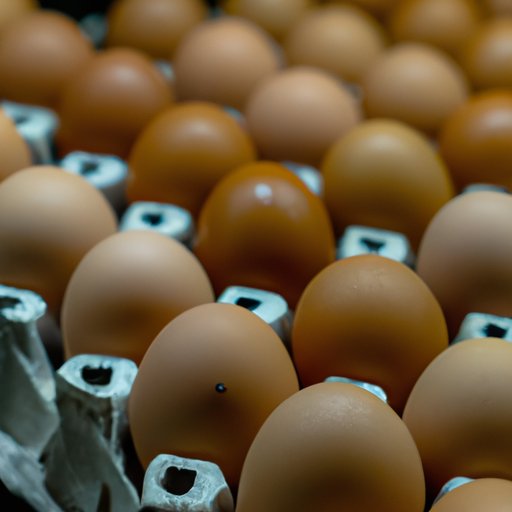
Introduction
Storing eggs in the proper conditions is key to ensuring their freshness and safety. Understanding how long eggs last and the factors affecting their shelf life can help you make the most of your egg resources and avoid any harmful consequences of consuming spoiled eggs. This article offers a comprehensive guide to egg storage, including tips for extending their freshness and identifying expired eggs.
How Long Can Eggs Last?
The shelf life of eggs varies depending on various factors, including storage conditions and the type of egg. Fresh eggs can last between three to five weeks when stored correctly, while pasteurized eggs, which are typically sold in cartons and require refrigeration, can last for months.
Egg freshness can be affected by temperature fluctuations, as eggs absorb odors and flavors easily. Therefore, eggs should be stored at a consistent temperature, ideally in the coldest part of the refrigerator, away from strong-smelling foods.
Storing Eggs
Eggs should be stored at a consistent temperature of 40 degrees Fahrenheit or lower, as this helps to maintain their freshness and safety. Storing eggs in the egg compartment of your refrigerator usually provides a stable and cool environment. In case your refrigerator does not have an egg compartment, the best alternative is to place them in their original carton on a shelf in the refrigerator.
Eggs should also not be stored on the refrigerator door, where the temperature fluctuates more significantly every time you open and close it.
You can also package your eggs in air-tight containers, which keep out any air that promotes spoilage. Note that eggs should always be stored with the pointed end down, as it helps to prevent the yolk from touching the air sac and prevents premature spoilage.
To extend the freshness of eggs, store them with the original carton or place them in an egg storage container. These containers have separate compartments for each egg, which minimizes movement and prevent the eggshells from cracking.
Types of Eggs
The various types of eggs have different shelf lives. Fresh eggs, including organic and free-range eggs, have a typical shelf life of three to five weeks. Consuming raw or undercooked eggs increases the risk of food poisoning, especially for young children, pregnant women, the elderly, and people with weakened immune systems.
Pasteurized eggs, which are typically sold in liquid form or as a liquid-egg substitute, have a longer shelf life of several months, but still, require refrigeration. As for hard-boiled eggs, their shelf lives are about a week if they’re stored in the refrigerator within two hours after boiling.
Detecting Spoiled Eggs
Spoiled eggs have a distinctive odor and should be discarded immediately before they cause any potential health concerns. Fresh eggs typically have a neutral smell and maybe an off smell when cracked, indicating that they’re not safe for consumption. If you notice any cracks in the eggshell or any signs of mold, discoloration, or sliminess on the egg’s surface, immediately discard them.
You can also conduct a float test to determine if your eggs are safe to eat. Place the eggs in a bowl of cold water, and if they float to the surface, implying that the egg’s air sac is enlarged as a result of bacterial growth, discard them.
Egg Freshness Myths
It’s a common misconception that egg freshness is determined by the date on the carton. The carton only indicates the last day that the eggs are recommended for sale, not their expiration date. Additionally, eggs can still be safe to eat beyond their expiration date if stored correctly and treated carefully.
Another egg freshness myth is that washing eggs forces harmful bacteria through the shell and into the egg, contaminating it. However, washing eggs with warm, soapy water, before storing them, often minimizes any external dirt or bacteria on their surfaces, thus enhancing safety.
Using Up Near-Expired Eggs
You can still make delicious meals with near-expired eggs. Hard-boiled eggs can go into salads, sandwiches or wraps, while scrambled eggs, Quiches, and frittatas are great for breakfast, lunch or dinner options. Baking with near-expired eggs is also another way of preventing them from going to waste. Cakes, cookies, and even homemade pasta require eggs and can help to extend their shelf life.
Conclusion
Storing eggs properly helps to preserve their freshness and maintain their safety, preventing any potential foodborne illness. Always store eggs in the refrigerator and be sure to discard spoiled eggs to enhance food safety standards. With the information provided in this guide, you can now make the most of your eggs and ensure they remain fresh for as long as possible.
Lastly, keeping eggs fresh is not rocket science. Always store them in the right conditions, keep them clean, and pay attention to the tips provided here.





